History
This history was prepared by Beth Halpern in celebration of TBH’s 75th anniversary in 2013, and is based on the work of Eva Goldberg, Lois and Dan Roselle, and Edie and Ben Bean.
Even though we are celebrating our 75th anniversary, the 1st Jews actually came to Olympia in the 1850s. In 1873 the Hebrew Benevolent Society raised money for various Jewish causes and in 1874 it paid $50 for the cemetery, the first Jewish cemetery in Washington. With the immigration in the early 1900s, our community began to grow. A Torah which was carried here from Europe by Jacob Bean was kept in his home and services were held there. Services were strictly Orthodox. Lots of Jewish businesses were established in Olympia: Olympia Auto Parts, Fredericks Apparel, Goldberg’s Furniture, restaurants, book store etc. And of course, Olympia Supply, which is still thriving today.
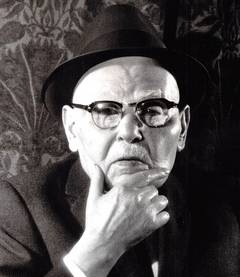 |
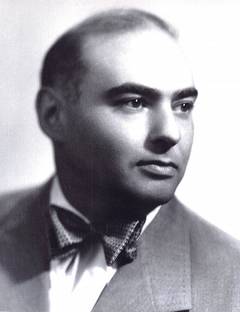 |
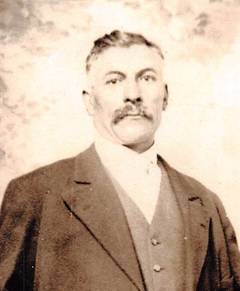 |
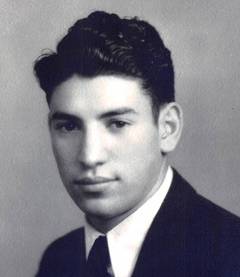 |
| Jacob Goldberg | Alan Goldberg | Jacob Bean | Percy Bean |
During this time a B’nai B’rith group was formed with Centralia, Chehalis, Aberdeen, and Elma. Meetings were held at Columbus Park with the children swimming and the adults playing Bingo after business was completed. The Civilian Conservation Corps (CCC) came to Thurston County in 1935 to build the buildings at Millersylvania State Park. The Jewish boys working there were welcomed into the homes of the Olympia Jews.
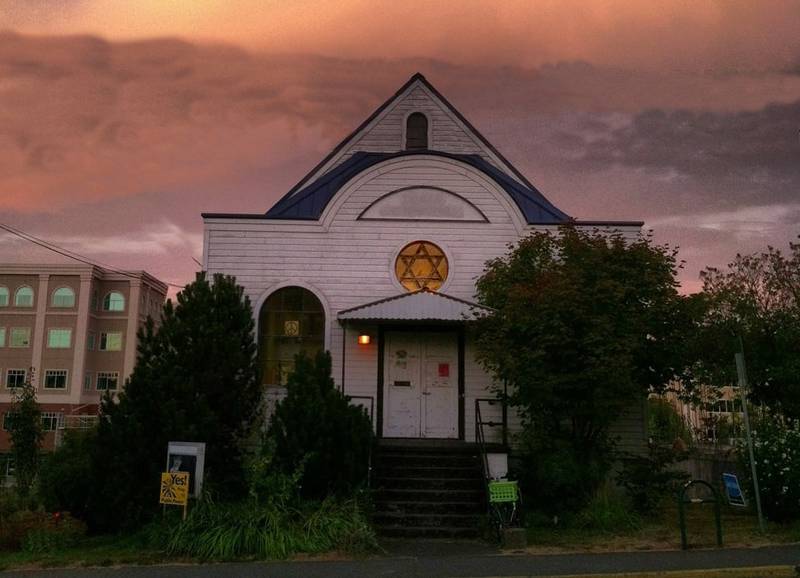 In 1937, TBH was incorporated by Earl Bean, Carl Hollander and Rueben Cohen and the original property on the corner of 8th and Jefferson was purchased for $537.12. Funding for the building was made possible from contributors from Seattle to Portland and west to Aberdeen and lots of places in between. The mortgage was $4,500. The building was dedicated on June 18, 1938 and the event was featured in an article in the Olympian. Taxes for the year of 1938 were $21.30. The monthly electrical bill averaged $2. In August of that year the first wedding was held in the new building, that of Percy and Annie Bean.
In 1937, TBH was incorporated by Earl Bean, Carl Hollander and Rueben Cohen and the original property on the corner of 8th and Jefferson was purchased for $537.12. Funding for the building was made possible from contributors from Seattle to Portland and west to Aberdeen and lots of places in between. The mortgage was $4,500. The building was dedicated on June 18, 1938 and the event was featured in an article in the Olympian. Taxes for the year of 1938 were $21.30. The monthly electrical bill averaged $2. In August of that year the first wedding was held in the new building, that of Percy and Annie Bean.
Unfortunately, or maybe fortunately, there was a fire in the building when it was just a few years old. Someone had cleaned the coal out of the stove. The hot coal was put in a paper bag or box and a fire began. Luckily, there was only smoke damage. But even luckier, there was insurance on the building and the insurance money was used to pay off the mortgage. Thus, by 1942 we were mortgage free.
During WWII families showed support for the cause in many ways- supporting refugees, organizing “Sundays at the Temple” for Fort Lewis soldiers and their families, working for the Red Cross, working for the USO, and of course actually serving on the front lines. During this time the communities of Aberdeen and Olympia arranged a safe haven for Rabbi Wolff from Dresden, Germany. He served both communities and did accounting for Goldberg’s store.
After the War, Orthodox services continued, led by Joe Josephson. Joe Josephson, who was Ben Bean’s uncle, made money by hauling cow hides and tallow to Seattle and returning with kosher meat to sell. He also played pinochle frequently with Jacob Goldberg and always won. At one point Jacob Bean and Jacob Goldberg were asked about incorporating English into the service. The response was “Just as long as you do the whole thing in Hebrew first.”
The congregation remained small during these years after the war held together by about 20 families. However, these families were very active. They celebrated festivals, supported each other for all life cycle events and raised money for Tzedakah. There was a Women’s group and a Men’s group. They met on the same night monthly, in separate rooms at the Temple, one upstairs and one downstairs and socialized afterwards. Annual Rummage Sales were held every year from 1957-1972 with the profit being from $250 to $450.
But it was not easy. It was during this time that some members suggested closing the doors as there was just not enough money to keep going. However, Al Goldberg insisted that “we will never close our doors”. And somehow the money was always found to keep the doors open.
Gradually during the 1960s the services became less Orthodox and more Conservative, and the kitchen was no longer strictly kosher. The Temple remained unaffiliated.
In 1971 the Evergreen State College opened and both Olympia and TBH began to grow. The congregation’s membership grew from 20 to 40 to eventually 80 families during the 70s and 80s. During this time TBH received support from rabbis and congregations throughout the NW with the most support coming from Rabbi Rosenthal from Tacoma. He helped in a myriad of ways from conducting classes, serving at life-cycle events, helping organize holiday celebrations, giving aid to the school and was always available to help and advise.
Growth continued and finally we were ready to hire our first part time rabbi, Rabbi Vicky Hollander. And in 1989 Rabbi Marna Sapsowitz was hired three-quarter time as both Rabbi and education director. After one year she became our first full time Rabbi. It had taken us 53 years.
 The congregation and the religious school both continued to grow. In fact so much that we actually outgrew our original building and began the long process of finding a new home. At this time we also realized that it was time to quit doing everything on our own, and after a thoughtful congregational study we affiliated with the Reconstructionist Movement in 2001.
The congregation and the religious school both continued to grow. In fact so much that we actually outgrew our original building and began the long process of finding a new home. At this time we also realized that it was time to quit doing everything on our own, and after a thoughtful congregational study we affiliated with the Reconstructionist Movement in 2001.
In 2003 Rabbi Sapsowitz decided to retire from TBH and we again spent a year “on our own” with the guidance of lay leader Amy Loewenthal. In the summer of 2003 Rabbi Seth Goldstein became our second full time Rabbi and in the spring of 2004 we moved into our present location.
During our entire history the members of TBH have made both the giving of tzedakah, money for helping others; and participating in Tikkun Olam, repair of the world, a priority. Even in the lean years TBH members gave time and money enthusiastically when they could to both Jewish causes and to the Olympia community. This tradition continues. We have cooked and served meals for those in need. We have worked at the Food Bank, hosted the homeless, held food and clothing drives and poured thousands of dollars into nonprofit organizations throughout Olympia via 24 years of Bagel and Blintz sales.
And here we are after 75 years. Ready to begin writing the history for the next 75 years.
Tue, October 21 2025
29 Tishrei 5786
Upcoming Events
-
Tuesday ,
OctOctober 21 , 2025Adult Hebrew (Online)
Tuesday, Oct 21st 6:00p to 7:30p
-
Wednesday ,
OctOctober 22 , 2025Lunch & Learn On-Line
Wednesday, Oct 22nd 12:00p to 1:00p
-
Saturday ,
OctOctober 25 , 2025Tot Story Walk during service
Shabbat, Oct 25th 10:00a to 11:30a
Newsletters
Stay Connected
TBH is located at 201 8th Ave. SE in Olympia, just one block west of the downtown library.
Privacy Settings | Privacy Policy | Member Terms
©2025 All rights reserved. Find out more about ShulCloud





